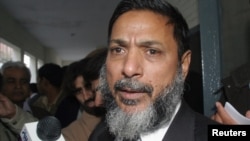ISLAMABAD —
A Pakistani lawyer is calling for the country’s Supreme Court to look into a U.S.-funded ad campaign broadcast on Pakistan television that attempted to defuse the anger at the United States regarding an anti-Islam video.
Lawyer Hashmat Habib, who has defended jihadist clients, claims the ad campaign is tantamount to U.S. propaganda regarding an amateur video mocking the Prophet Muhammad.
The video that appeared on the Internet set off protests around the Muslim world. The protests left almost 20 dead in Pakistan after rioters took to the streets across the country.
The U.S. State Department tried to explain the U.S. position on the video by paying Pakistan mainstream news channels to air a series of public service announcements. The ads featured President Barack Obama and Secretary of State Hillary Clinton denouncing the anti-Islam video.
But Habib lashed out at the advertisements and criticized the Pakistan government and media for allowing them to run.
“These Pakistani media are also committing a crime, and they also may be put to task by the Muslims in the world,” said Habib.
Habib’s criticism underlines the increasing frustration of some in Pakistan about material offensive to Islam, and who blame the United States for allowing it to continue.
According to the U.S. embassy in Islamabad, the ad campaign was to run for four days on radio networks and five days on TV prior to the mass protests that rocked the country. The ads ran on prime time in the local Urdu language, or with subtitles.
An interpreter for a medical NGO in northwest Pakistan, Haroon Kahn, did not think much of the effort.
He says, “My personal view is that there is very little impact of that advertisement of the U.S. government on the Pakistani people, because hatred against the United States is increasing in Pakistan and the release of the video added fuel to the fire.”
Independent media analyst Adnan Rehmet said the ads likely reached an estimated 70-million people. But they did not stop the thousands who took to the streets.
“There are always these fringe groups in Pakistan whose whole politics are premised on this perceived grievance that the U.S. is interfering too much in Pakistan’s affairs and is conspiring to undo Pakistan or something, or is attacking Islam,” said Rehmet.
U.S. Embassy spokeswoman Rian Harris said Monday that the objective was to reach out and explain the U.S. position to as many Pakistanis as possible. Harris said the U.S. believed it had reached that goal.
But Rehmet said unless the controversial video was pulled off the Internet, little would persuade the more extremist groups that their concerns were being addressed.
The violent protests revealed some of the deep divisions in Pakistan society. In broadcasts after the riots, one Pakistan pop radio station in Lahore criticized the destruction of property and loss of life. In Islamabad, a youth group reached out over social media and organized a street cleanup, with one supporter Tweeting: “let the world know that real Pakistanis do not believe in violence!”
Lawyer Hashmat Habib, who has defended jihadist clients, claims the ad campaign is tantamount to U.S. propaganda regarding an amateur video mocking the Prophet Muhammad.
The video that appeared on the Internet set off protests around the Muslim world. The protests left almost 20 dead in Pakistan after rioters took to the streets across the country.
The U.S. State Department tried to explain the U.S. position on the video by paying Pakistan mainstream news channels to air a series of public service announcements. The ads featured President Barack Obama and Secretary of State Hillary Clinton denouncing the anti-Islam video.
But Habib lashed out at the advertisements and criticized the Pakistan government and media for allowing them to run.
“These Pakistani media are also committing a crime, and they also may be put to task by the Muslims in the world,” said Habib.
Habib’s criticism underlines the increasing frustration of some in Pakistan about material offensive to Islam, and who blame the United States for allowing it to continue.
According to the U.S. embassy in Islamabad, the ad campaign was to run for four days on radio networks and five days on TV prior to the mass protests that rocked the country. The ads ran on prime time in the local Urdu language, or with subtitles.
An interpreter for a medical NGO in northwest Pakistan, Haroon Kahn, did not think much of the effort.
He says, “My personal view is that there is very little impact of that advertisement of the U.S. government on the Pakistani people, because hatred against the United States is increasing in Pakistan and the release of the video added fuel to the fire.”
Independent media analyst Adnan Rehmet said the ads likely reached an estimated 70-million people. But they did not stop the thousands who took to the streets.
“There are always these fringe groups in Pakistan whose whole politics are premised on this perceived grievance that the U.S. is interfering too much in Pakistan’s affairs and is conspiring to undo Pakistan or something, or is attacking Islam,” said Rehmet.
U.S. Embassy spokeswoman Rian Harris said Monday that the objective was to reach out and explain the U.S. position to as many Pakistanis as possible. Harris said the U.S. believed it had reached that goal.
But Rehmet said unless the controversial video was pulled off the Internet, little would persuade the more extremist groups that their concerns were being addressed.
The violent protests revealed some of the deep divisions in Pakistan society. In broadcasts after the riots, one Pakistan pop radio station in Lahore criticized the destruction of property and loss of life. In Islamabad, a youth group reached out over social media and organized a street cleanup, with one supporter Tweeting: “let the world know that real Pakistanis do not believe in violence!”









